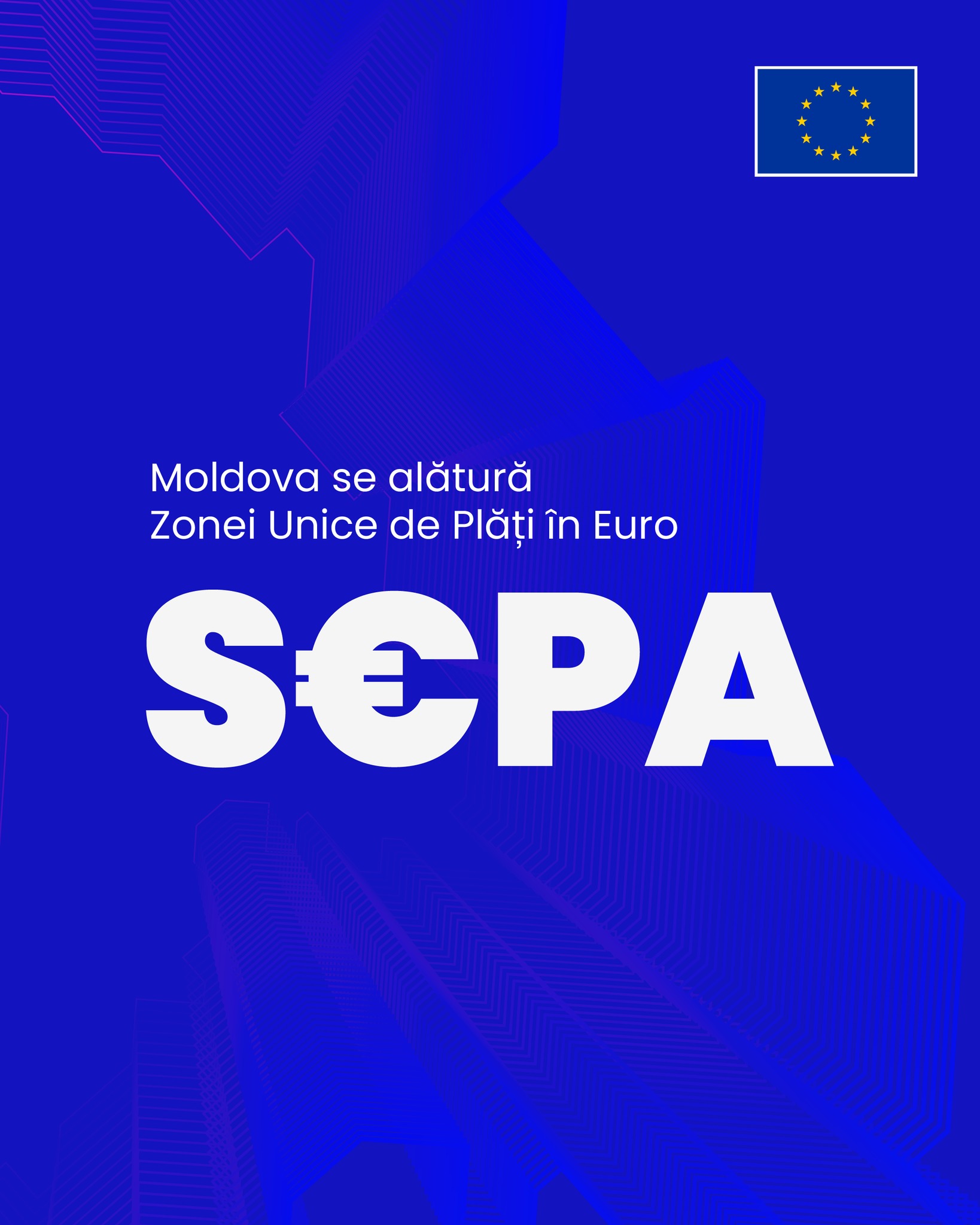
Moldova accepted into Single Euro Payments Area
Moldova has been accepted into the Single Euro Payments Area (SEPA). Membership in SEPA means faster, safer and more affordable international euro payments for citizens and businesses.
Governor of the National Bank of Moldova Anca Dragu has said that joining SEPA marked a historic moment and was clear proof that Moldova is ready to align with the highest European financial standards.
"This step will provide Moldovan citizens and companies access to a faster, safer, and very low-cost or even free payment system. At the same time, it will help cut costs for money transfers made by the Diaspora, an essential aspect for many families in Moldova. Moldova's economy thus becomes more attractive to foreign investors, more prosperous and more resilient, fostering a better life for each citizen. The today's decision strengthens our irreversible path towards European integration," said Anca Dragu, during a working visit to Brussels.
SEPA (Single Euro Payments Area) allows euro transfers to be made easily and efficiently, removing administrative barriers and significantly reducing the costs of international transactions. Through this membership, Moldova becomes part of a modern financial system, facilitating its economic integration into the European space.
According to the National Bank of Moldova, joining SEPA will make a real difference in the lives of families who receive money from the Diaspora. More money will be in Moldovans' pockets, as high fees for international transfers will become history.
"Thus, for Moldovans working in the EU and sending money home, SEPA means faster, cheaper and more efficient transfers. They will no longer have to pay exorbitant fees just to help their families. For example, today, an international euro transfer for Moldovans costs between 20 and 200 euros, but after joining SEPA, the same transfer could cost just 1-2 euros or even 50 cents," the National Bank of Moldova said.
Over 60 percent of Moldova's exports are oriented towards the European Union, and the accession to SEPA will facilitate commercial payments for companies. Without additional fees and without delays, Moldovan firms will be able to make euro transactions at the same costs as those in the EU, helping them to be more competitive on the international market.
Calculations show that, through this membership, Moldova will immediately save about 12 million euros annually and in the medium term - up to 20 million euros, money which remains in the national economy and supports business development.
Moldova's accession to SEPA is not only an advantage for citizens and the local business environment, but also a strong signal for investors. Through this integration, Moldova shows that it has a financial system compatible with the European payment infrastructure, thereby enhancing the confidence of international companies seeking to invest in the local market, while also creating jobs.
Besides economic and investment benefits, joining SEPA marks an important stage in the digitalization of payments. This change strengthens financial relations with the European Union and offers more stability and predictability for the economy.
According to a World Bank study, cross-border payments are six times more expensive outside SEPA compared to already integrated countries. Thus, joining SEPA will facilitate Moldova's sustainable economic development, providing real benefits to citizens.
The National Bank of Moldova officially submitted its application to join SEPA on January 30, 2024.
In the coming months, commercial banks will make the necessary technical adjustments to ensure fast, safe and significantly more accessible euro payments. The National Bank of Moldova will also closely monitor this transition, providing technical and regulatory support for a smooth shift.
SEPA is a European system that facilitates cross-border euro payments, eliminating the differences between national and international payments. SEPA includes all European Union countries, as well as other participating states and territories.
World Bank Group has new country manager for Moldova
Lower petrol and diesel prices announced by ANRE for Thursday
PHOTO // Significant investments in Moldova's roads
Entrepreneurs can apply for grants of up to 600,000 lei for business development through three programs managed by ODA
Moldova reaches new renewable energy record: 48% share surpassed on 29 June
Investments in building energy efficiency can reduce energy resource costs by about 120 million lei
Energy Community Secretariat welcomes Moldova's progress in integrating into EU energy market
VIDEO // Over 70 per cent of owners of lands needed for Vulcanesti-Chisinau overhead power line receive expropriation compensations
Law on 3,000 lei supplement for young employees signed by head of state
Historic Moment. European leaders expected in Chișinău today for first Moldova-EU bilateral summit
President on working visit to Strășeni district
Ukrainian Ambassador to Moldova: Those who committed war crimes must be held accountable
Prime Minister inspected repair works on R26 Bender – Căușeni – Cimișlia road
Moldovan speaker on growing cases of journalist intimidation
President to visit Poland, Italy to strengthen Moldova's European path
Moldovans working in Switzerland to have access to pensions and social guarantees
Gagauzia's bashkan to hear sentence on 5 August
National culture preserved by Moldovans in Kazakhstan
Soroca, Otaci, Vulcanesti to have roads rehabilitated with EBRD support
295,000 students to receive 1,000 lei before new school year
Budget Plus // Over 4.8 million lei to be allocated for modernizing canteens in Ungheni schools
Casa Verde Program launched in Moldova
State to provide more funds for early detection of breast cancer
Fiscal adjustments approved by Parliament
Cîrnățeni village - model of rural development


